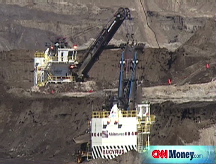Oil futures: Know when to hold 'em
Rumors that Mexico is locking in oil contracts for future delivery at today's prices prompt questions of whether oil's record run has come to a halt.
 |
| With prices at $135 a barrel, some producers scramble to lock in long-term contracts. |
NEW YORK (CNNMoney.com) -- In the last three days oil prices have fallen by roughly $10 a barrel. Many analysts say slackening demand, or the threat of it, is the main culprit.
But another force could be at work in the background. Last week various analysts said there was talk that Mexico, the world's fifth largest oil producer, was hedging its bets - the country was said to be signing contracts to deliver oil several years into the future at today's prices. Essentially, it was betting oil prices have peaked.
"This is a smart move," said Phil Flynn, senior market analyst at Alaron Trading in Chicago, who also thinks there's a good chance prices have peaked. "If I were an oil producer, I'd want to lock in these prices."
Analysts say if other oil producers follow suit and lock in future contracts, that could be one thing that would cause oil prices to fall, far and fast.
But it's hard to tell if that's happening because information about who is buying what is kept private for competitive reasons.
"I don't know who else is doing it," said Nauman Barakat, an energy trader at Macquarie Futures, and one of the traders who mentioned the Mexico news in a research note. "There's been a lot of talk, but it's kept very confidential."
One analyst, speaking on background only, said he had confirmed Mexico was locking in futures contracts. He said it was being done at the behest of the Mexican government, eager to balance a long-term budget, rather than a bet by state oil company PEMEX, that prices will fall.
But could Mexico's move inspire similar steps from other oil producers, and cause oil prices to fall further?
"Absolutely," said Neal Dingmann, senior energy analyst at Dahlman Rose & Co., a New York-based energy investment boutique. "It could create a top in [oil prices] in the near term."
Dingmann said about 50% of the production from the firms he covers - mostly small firms - has been sold for future delivery at today's prices.
The selling from Mexico also raises another question: Oil companies and OPEC have long said oil prices are too high - driven by Wall Street speculators and a falling dollar rather than supply and demand.
So if they really think prices are too high, why aren't they all locking in contracts now?
For starters, it's believed some heavyweights, like Saudi Arabia and Exxon Mobil, don't play the futures market at all - they don't get into the complicated dance of buying and selling futures contracts on NYMEX or any other markets.
In vastly simplified terms, they take whatever price is being offered when their tankers pull into port.
Second, there aren't enough takers for these types of contracts. There simply aren't enough people who are willing to pay $135 dollar for a barrel of oil delivered in 2013, said Fadel Gheit, a senior energy analyst at Oppenheimer.
"Exxon produces 1.2 billion barrels of oil a year," said Gheit. If someone locked in all that production for five years out at today's prices, and crude fell 20%, "it would be a disaster," he said.
For Saudi Arabia and other OPEC counties, non-OPEC oil producers like PEMEX locking in future contracts is a problem.
When the price of oil falls OPEC likes to pump less oil to keep prices up. If producers sign long term contracts, they're obligated to pump that oil making it more difficult for OPEC to control prices.
"You get stuck with this extra production that's out there," said John Kilduff, an energy analyst at MF Global in New York. "Then OPEC has to reduce market share just to maintain price."
On the New York Mercantile Exchange, things are looking fairly balanced for the first time in a long time.
Big commercial users of oil, like refineries, trucking companies and airlines, are holding just slightly more "short" contracts - contracts where they are betting the price of oil will fall - than "long" contracts, according to Addison Armstrong, director of market research at Tradition Energy Futures, an energy brokerage based in Stamford, Conn.
Previously, commercial users had overwhelmingly been betting prices would fall, and much of the runup in oil prices over the last few months was a result of them selling or closing out those short contracts and buying long ones, said Armstrong.
Meanwhile, non-commercial users - like banks and pension funds - are holding just slightly more long positions. The market, said Addison, is pretty well balanced.
However, that doesn't mean we won't see more of the huge price swings of the last few days, swings that have come to characterize the oil market of late.
"I wouldn't bet on less volatility," said Armstrong. ![]()



